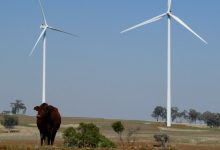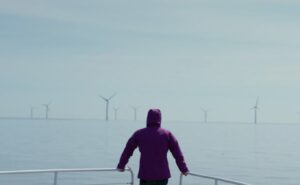One of Australia’s biggest financial institutions, the Commonwealth Bank of Australia has become the first Australian-owned major corporate to pledge to go 100 per cent renewables, joining another 154 international companies that have signed up to the global RE100 program.
The commitment announced on Wednesday will see the Commbank sign a long term deal with CWP Renewables and Partners Group with the Sapphire wind farm that the Commbank helped finance, and will also diversify into that projects solar and battery installations when they are complete.
The announcement by Commbank comes just weeks after a roadshow in Australia by the Climate Group’s Sam Kimmins, who heads the RE100 program. Listen to our podcast with Kimmins here.
Those 154 international companies have a total annual electricity consumption nearly as big as Australia’s main grid, and 75 of them have operations in Australia that are also going 100 per cent renewable, such as CUB – a unit of InBev – which will buy power from the new Karadoc solar farm.
Commbank, however, becomes the first Australian company to commit to 100 per cent renewables, going further than other corporates such as Sun Metals, Telstra, Bluescope, and others who have signed contracts for part of their consumption.
More Australian companies are expected to sign up, joining global leaders such as Facebook, Google, GM and Apple, and sending a powerful message to Australia’s politicians ahead of two key state elections – NSW and Victoria – and the next federal election that will be held by May.
The headline initiative from the Commbank announcement is the signing of a 12 year power purchase agreement with CWP Renewables, initially to take some 96,000MWh a year from the 270MW Sapphire wind farm west of Glen Innes in the New England region of NSW.
It could later split this 50/50 between the Sapphire wind farm and the Sapphire solar farm that will be built alongside by 2020, and the contract allows for the battery storage component planned by CWP to also be included.
“To have Commonwealth Bank as one of our direct buyers reinforces the fact dispatchable low cost renewable energy is viable and economical,” said CWP’s Alex Hewitt.
That contract will account for 66 per cent of Commbank’s electricity needs by January, 2019. Commbank has already cut its electricity use by 54 per cent since 2009 via energy efficiency measures, and has installed nearly 1MW of rooftop solar on more than 50 different branches.
 CBA head group property Jennifer Saiz says it is as much about saving money as being a good corporate citizen. The other major international companies are also switching because of the money saved from cheap renewables, Kimmins told RenewEconomy last month.
CBA head group property Jennifer Saiz says it is as much about saving money as being a good corporate citizen. The other major international companies are also switching because of the money saved from cheap renewables, Kimmins told RenewEconomy last month.
“The business case for moving to renewable energy is sound, it makes sense both from a sustainability perspective and economically. The benefit of long-term PPA’s is cost certainty and we expect it will deliver cost savings for the company,” Saiz said in an emailed statement.
Energy consultant Jon Dee, who is working with RE100 in Australia, and is also head of the activist group Do Something says the CBA is the perfect first company for RE100 in Australia because “it is really a solid example” of how to do it properly.
“I’ve written a book on energy efficiency on business and have gone into many businesses and seen who is doing a good job,” Dee told RenewEconomy.
“This has to be the best ones I have seen, and they are doing things in the right order: Energy reduction first, rollout solar on rooftops, and then move to a PPA (with large scale wind or solar).
RE100’s Kimmins said in a statement that “around the world, forward-thinking companies want access to clean, cheap power that lowers emissions and increases competitiveness.
“Long-term renewable energy purchasing agreements like this support the development of new energy infrastructure and actively bring more renewables online. We’re confident that other major Australian companies will follow Commonwealth Bank’s lead.”
Commbank says it is aiming to get to 100 per cent renewables by 2030, although it is not entirely clear why it needs to wait that long, given that it will get to more than 65 per cent renewables by next year.
So why not sign up another wind and solar farm, particularly if it is saving money by doing so. (Nothing wrong with a headline that says “we’re going 100 per cent renewable by Friday.”)
Saiz responded: “The commitment is across our global operations. The PPA announcement is a significant step forward in achieving this goal and creating our pathway for carbon neutrality and while we hope that we can be 100 per cent renewable before 2030, we are still finalising our plans.”








